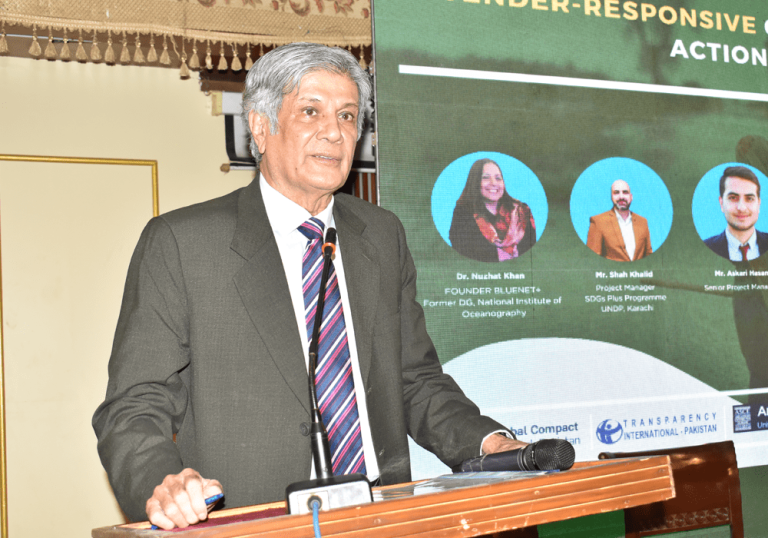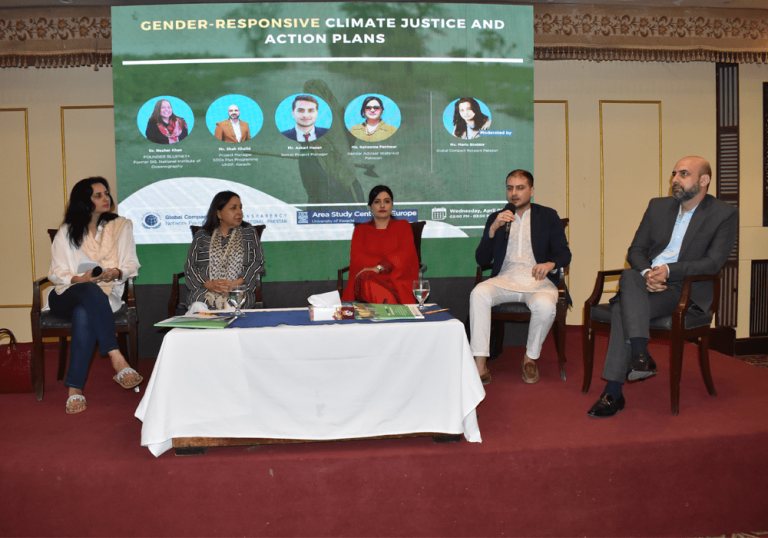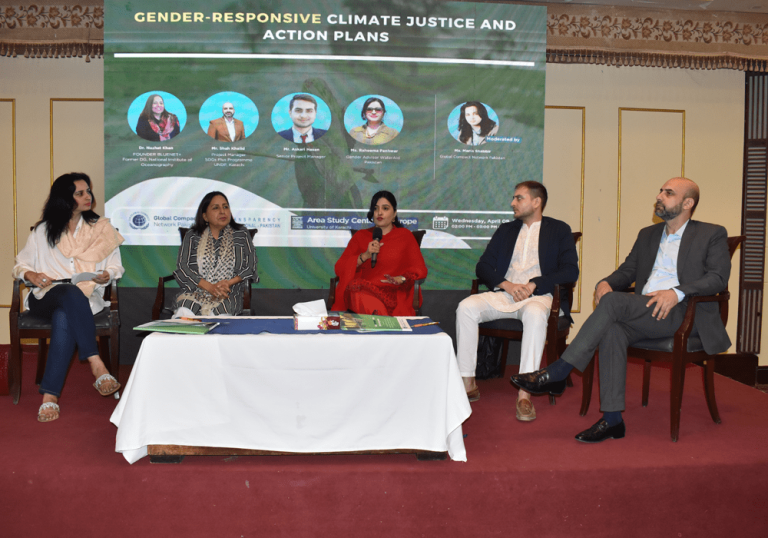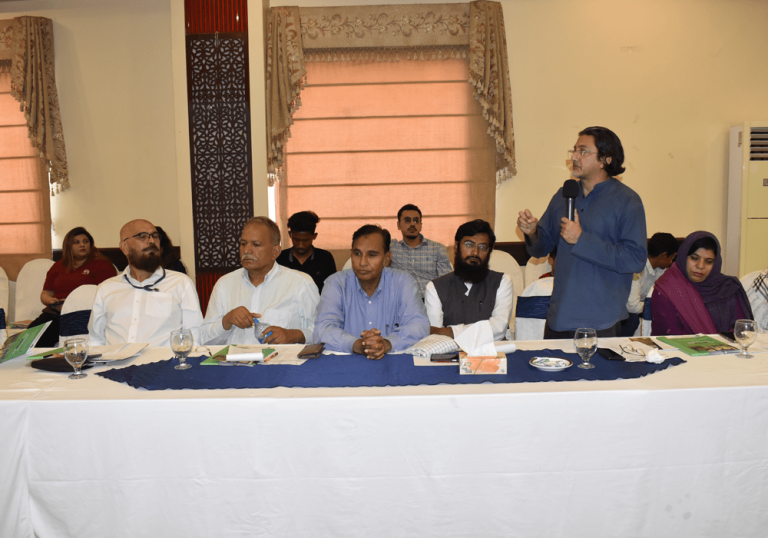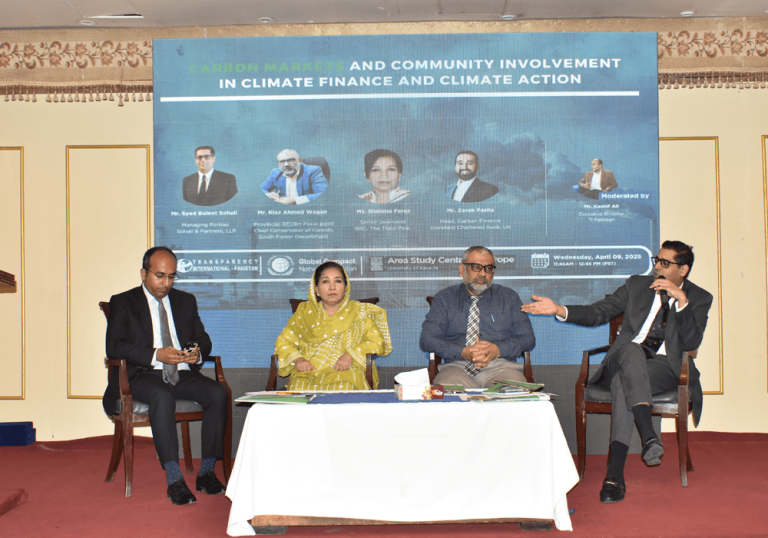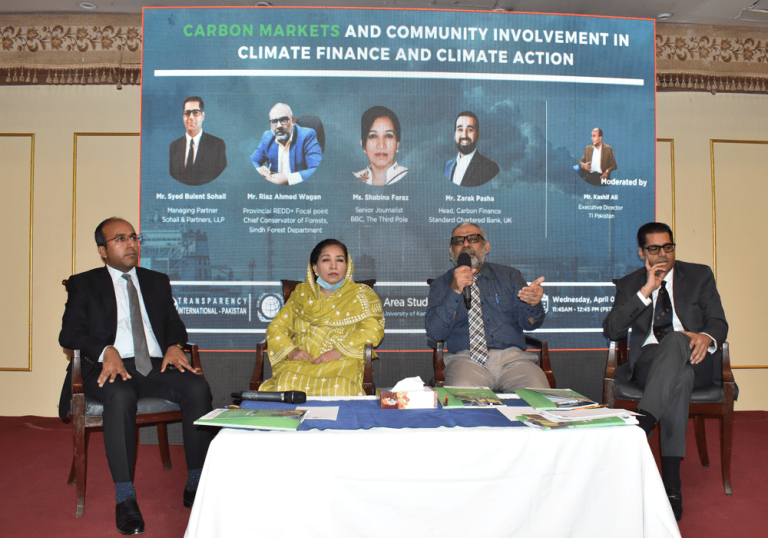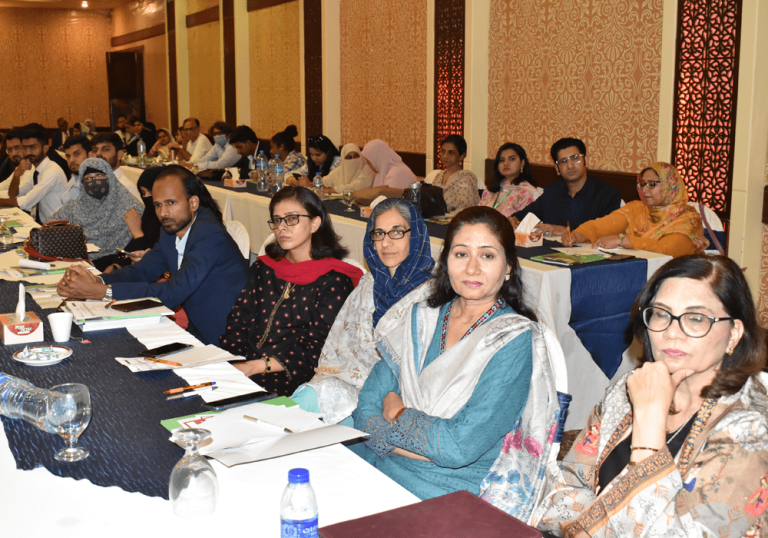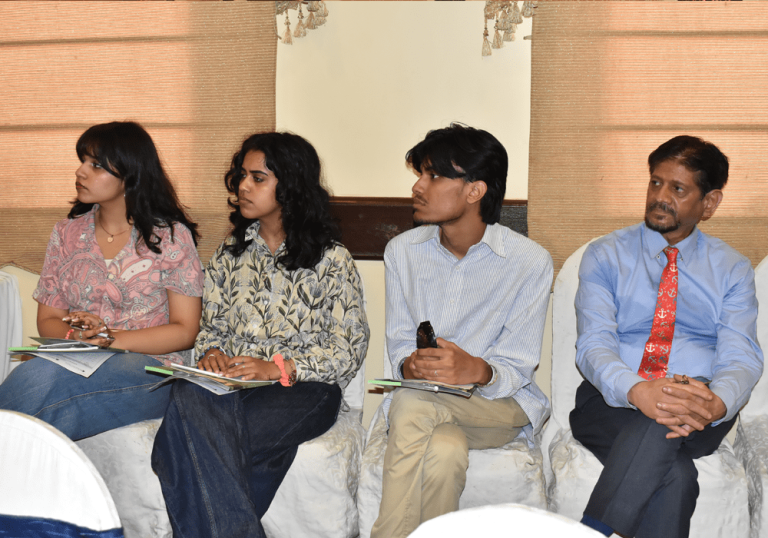Collective Action for Climate Justice: Bridging Gaps in Governance, Finance, and Gender for a Resilient Future
Collective Action for Climate Justice: Bridging Gaps in Governance, Finance, and Gender for a Resilient Future
Venue: Royal Rodale Club, DHA, Karachi
Date: Wednesday, April 09, 2025
Transparency International Pakistan in collaboration with the Area Studies Centre for Europe (ASCE), University of Karachi and the Global Compact Network Pakistan (GCPN) jointly organized a conference “Collective Action for Climate Justice: Bridging Gaps in Governance, Finance, and Gender for a Resilient Future” on April 09, 2025, at Royal Rodale Club, DHA, Karachi.
The conference brought together representatives from the Climate Change Department, senior corporate representatives, members of civil society, academia, journalists and citizens to forge collaborative strategies for addressing gaps in climate governance, transparency in the utilization of climate finance and gender integration into climate action. The conference was attended by more than 120 participants.
The event started with a recitation of the Holy Quran. Prof. Dr. Uzma Shujaat, Director, Area Study Centre for Europe (ASCE) University of Karachi delivered the welcoming remarks. She emphasized Pakistan’s vulnerability to climate crisis and highlighted the importance of inclusive dialogue and collaborative efforts, necessary for climate justice and bridging the existing gaps in governance, finance, and gender equity.
Mr. Ahyan Mustafa Bhutto, Special Secretary, Environment, Climate Change & Coastal Development Department, Government of Sindh delivered opening remarks. He briefed the participants on the efforts of the provincial government of Sindh in tackling climate challenges. He highlighted that in line with Pakistan’s NDCs, the GoS has introduced electric buses and the province is implementing the country’s only carbon markets project. He further highlighted that Sindh has Climate Change Policy 2022 in place, however, implementation and sectoral integration is the challenge. The policy emphasizes climate justice by focusing on equitable climate action, involving communities in climate action, protecting climate migrants, and climate finance. He encouraged the participants to provide their recommendations to the department on how climate governance can be strengthened so the province is able to effectively tackle climate change issues as well ensure that the communities in rural areas of the province, most affected by the climate crisis are better protected.
Moving on, Mr. Kashif Ali, Executive Director TI Pakistan spoke on “Climate Governance: Enhancing Community Participation, Effectiveness, and Transparency.” He emphasized that limited public participation in climate governance has hindered translating benefits of climate action to the lower level. He emphasized that while Pakistan has taken key steps in establishing institutions such as climate change authority and operationalizing climate change council, however, reforms and improvements are needed within the Public Financial Management (PFM) System to ensure that the planning, budgeting, implementation and post implementation phases of the projects not only incorporate climate-relevant features but also ensure community participation and inclusion in the decision making.
Afterwards, Mr. Khalid Junejo, Executive Director, Global Compact Network Pakistan (GCNP), emphasized the deep interconnection between climate action and sustainable development. He highlighted that addressing climate change is not a standalone goal, but a critical pathway to achieving the broader Sustainable Development Goals (SDGs). Mr. Junejo stressed the importance of private sector engagement, responsible business practices, and multi-stakeholder collaboration in driving inclusive, resilient development. He called for aligning corporate strategies with climate goals to ensure long-term sustainability and shared prosperity.
Next, Ms. Simi Kamal, Chairperson, Hisaar Foundation delivered detailed presentation on climate justice for communities affected by climate change. She emphasized that water is central to Pakistan’s climate resilience, yet water governance remains deeply unjust, shaped by colonial legacies, patriarchal structures, and elite control. Vulnerable groups including landless farmers, the urban poor, women, and downstream communities, face exclusion from both access and decision-making. She highlighted systemic failures such as the absence of equitable water laws, lack of gender-sensitive policies, and elite-driven subsidies. Ms. Kamal recommended the need to recognize water as a human right and emphasized on integrating gender justice by mainstreaming women into local water governance, ensuring their leadership, training, and access to funding.
Following the tea break, the conference converged for the Plenary Session 1: Carbon Markets and Community Involvement in Climate Finance and Climate Action, led by Transparency International Pakistan. The plenary featured insights from a diverse panelist including Mr. Syed Bulent Sohail, Managing Partner, Sohail & Partners LLP, Mr. Riaz Ahmed Wagan, Provincial REDD+ Focal Point / Chief Conservator of Forests, Sindh Forest Department, Ms. Shabina Faraz, Senior Journalist, BBC/The Third Pole, and Mr. Zarak Pasha, Head of Carbon Finance, Standard Chartered Bank UK. The panel was moderated by Mr. Kashif Ali, Executive Director, TI Pakistan. The discussion focused on how the country can develop credible and inclusive carbon market frameworks that advances both national climate goals, local development priorities and ensure transparency in the operations of carbon markets.
Panelists offered insights on legal and policy frameworks, carbon market projects implementation, journalistic coverage, and the role of the financial sector in scaling up climate finance. One key area of discussion was the need to strengthen legal and policy infrastructure. While recent national guidelines on carbon markets were seen as a step in the right direction, panelists emphasized the importance of robust legal mechanisms to ensure transparency, accountability, and equitable benefit-sharing, especially as Pakistan seeks to position itself as a viable destination for international climate finance.
The Delta Blue Carbon Project was cited as a noteworthy national initiative, showcasing how nature-based solutions can generate both environmental and financial benefits. Panelists noted that similar projects could be implemented in other ecological zones across the country, particularly in forestry and coastal regions, provided they are backed by community engagement and strong safeguards as well as data disclosure on how these projects are contributing to benefit sharing.
From a journalist’s perspective, Ms. Shabina Faraz, highlighted that climate finance remains underreported in Pakistan. Public understanding of how climate funds are mobilized, who the key stakeholders are, and how communities benefit remains limited. Panelists emphasized the need to strengthen climate journalism by providing journalists with greater access to data, training, and opportunities to engage with institutions. This is especially important in the context of climate-induced disasters, such as the 2022 floods, where effective reporting can drive greater transparency and accountability.
Furthermore, the plenary also emphasized the role of the financial sector as an emerging area of influence. Financial institutions in Pakistan are showing increasing interest in carbon markets, and there is growing recognition of the need to integrate climate finance into mainstream banking and investment practices. Panelists highlighted the importance of fair pricing, risk management, and stronger collaboration between public and private sectors to scale up support for credible carbon projects.
The second Plenary titled “Gender-Responsive Climate Justice and Action Plans” resumed after lunch break was led by Global Compact Network (GCPN) and brought together distinguished panelists including Dr. Nuzhat Khan, former Director General National Institute of Oceanography, Founder/CEO BLUENET, Mr. Shah Khalid, Project Manager, SDGs Plus Programme, UNDP, Mr. Askari Hasan, Senior Program Manager, Pathfinder Pakistan, and Ms. Raheema Panhwar, Gender Advisor, WaterAid Pakistan. The plenary was moderated by Ms. Maria Shabbir.
The discussion brought to light the complex and intersectional impacts of climate change on vulnerable groups in Pakistan, particularly women, children, and transgender individuals. While climate events like floods or droughts do not discriminate in occurrence, their consequences are disproportionately harsh on marginalized populations due to existing social, economic, and political inequalities.
The plenary stressed that truly gender-responsive climate action must move beyond treating women and marginalized communities as passive recipients. Instead, it must recognize their agency, strengthen their role in decision-making, and ensure their representation in climate governance at all levels. This includes designing inclusive frameworks that reflect the needs and contributions of PWDs, transgender individuals, and other at-risk groups, empowering them with resources, voice, and authority to shape climate resilience strategies.
Towards the end, Mr. Justice (R) M. Ather Saeed, former judge Supreme Court of Pakistan and Board of Trustee, TI Pakistan delivered the closing remarks. He said that it is imperative that climate justice is embedded into our legal frameworks. We must prioritize the development and enforcement of robust climate legislation that holds both public and private actors accountable for environmental degradation. Existing environmental laws must be updated to reflect the realities of climate change, and we must create stronger linkages between climate policy, human rights protections, and constitutional guarantees, especially the right to life, health, and a clean environment.
Justice (R) Saeed emphasized working toward the institutionalization of climate justice through judicial and legislative reforms. He highlighted the need to empower specialized environmental tribunals with greater jurisdiction, technical expertise, and resources to ensure swift justice in climate-related cases. He noted that Pakistani courts have already demonstrated leadership on environmental rights, and now is the time to expand that vision toward a more comprehensive climate justice jurisprudence.



